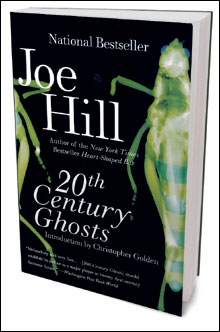
BRAM STOKER WINNER: Joe Hill. |
Joe Hill writes great horror stories because he recognizes that true fear stems not just from the macabre — or, that the macabre is more than ghouls and gore. At a time when real-life events seem both horrifying and surreal, Hill’s 20th Century Ghosts (Harper Collins) raises the question: Who needs monsters, when we have ourselves, and our messed-up minds, to contend with?Hill’s story collection won the Bram Stoker Award for horror writing when it came out in 2007; now, the genre-bending stories are out for another terrifying spin in paperback. And with Halloween right around the corner, the re-issue is perfectly timed — these are the most spine-tingling words to hit the shelves since Harper Collins published Scary Stories to Tell in the Dark in 1986.
The two stories that bookend Hill’s collection are two of his finest and most entertaining. With its metafictional take on the horror genre, “Best New Horror” is a tongue-in-cheek opening salvo. As it follows horror-anthology editor Eddie Carroll through a harrowing, sinister, and open-ended search for a disturbed fiction writer, the story provides an exploration of what readers expect from traditional horror fiction, as well as a platform from which to shatter those preconceptions.
Indeed, while the final story in 20th Century Ghosts does take some creepily fantastic turns (okay, a cardboard box serving as a portal to a never-defined world is probably firmly defined as fantasy), “Voluntary Committal” reads less like horror and more like a deftly crafted coming-of-age tale, complete with themes of thwarted sexual desire, family alienation, and fear of the unknown. Again, in this story of labyrinthine cardboard forts, mixed-up brains, and repressed memories, Hill plays with the very idea of fiction, of the stories we tell ourselves and others. And while yes, it’s scary to not know where Eddie Prior disappears to once he crawls inside an idiot-savant’s basement cardboard maze, it’s scarier to read the narrator’s detached description of the event, and his efforts to repress the related recollections: “I can go on for a while longer,” he says, “pulling myself through the dark, through the dark spaces of my own memories. Who knows what may lie just around the next corner?”
Hill, a New Englander, is a genre-bender because he twists our quotidian apprehensions into monstrosities, turning emotional short-story fodder into truly scary stuff. Our fear of death. Our fear of going broke. Our fear of being without love, or of being misunderstood, or of being treated unkindly. The way Hill writes about them — tensely, evocatively — these concepts become more frightening than blood or guts could ever be.
| 20th Century Ghosts by Joe Hill | Harper Collins | paperback | 316 pages | $13.95 | book discussion October 16 at 7 pm (rsvp to riverrunevents@gmail.com) | reading October 25 at 5 pm (no rsvp needed) | both at RiverRun Books, 20 Congress St, Portsmouth NH | free | 603.431.2100 |
One of the most successful, and lingering, stories in the book is “Pop Art,” a surreal tale about a boy and his inflatable best friend, Arthur Roth. The boy (the narrator) and Art are insightful, loving friends, but Art is terrorized by Happy, the boy’s father’s nasty dog (who represents the equally nasty father); the beast ends up contributing to Art’s too-early demise. The story is short and its ending is rather sweet. But about three-quarters of the way through this non-horror story, the narrator articulates the book’s most grisly idea:
“It is my belief that, as a rule, creatures of Happy’s ilk — I am thinking here of canines and men both — more often run free than live caged, and it is in fact a world of mud and feces they desire, a world with no Art in it, or anyone like him, a place where there is no talk of books or God or the worlds beyond this world, a place where the only communication is the hysterical barking of starving and hate-filled dogs.”
In that sentence, Hill is at his mirror-wielding, shiver-inducing best.